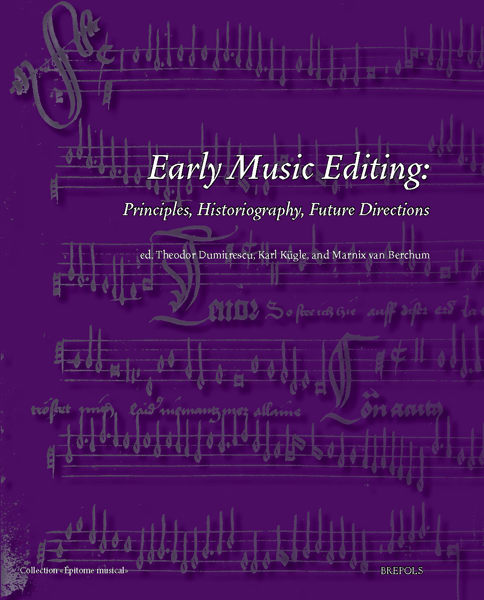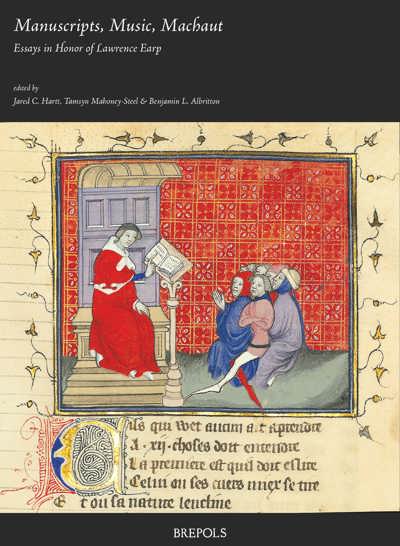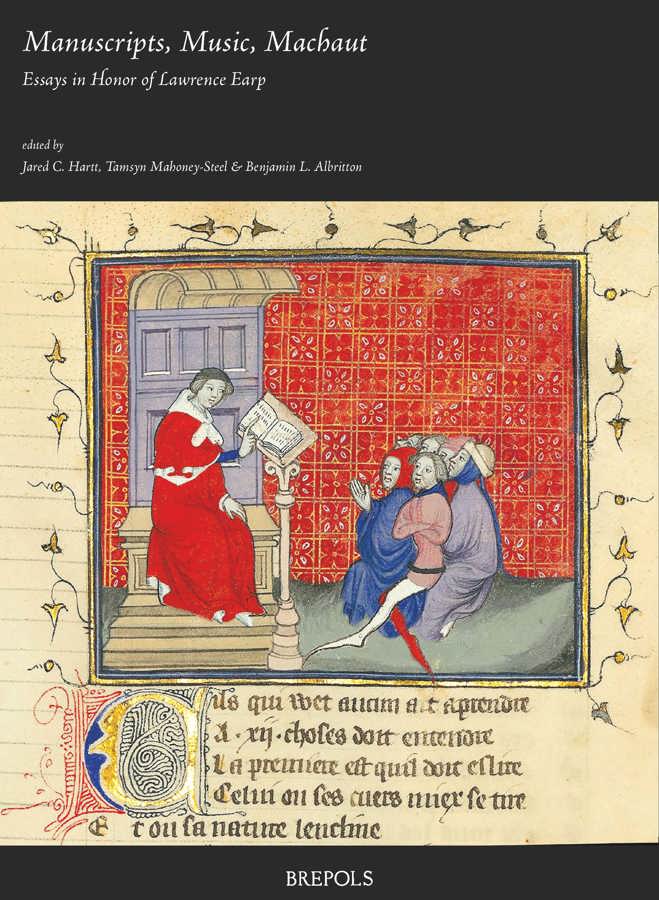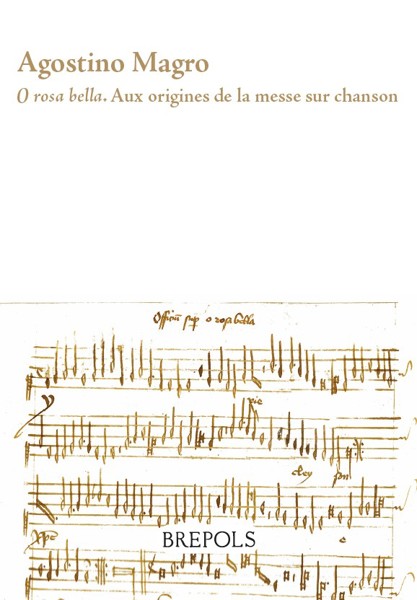
Manuscripts, Music, Machaut
Essays in Honor of Lawrence Earp
Jared C. Hartt, Tamsyn Mahoney-Steel, Benjamin Albritton (eds)
- Pages: 628 p.
- Size:178 x 254 mm
- Illustrations:7 b/w, 73 col., 38 tables b/w., 76 music examples
- Language(s):English
- Publication Year:2022
- € 90,00 EXCL. VAT RETAIL PRICE
- ISBN: 978-2-503-60299-8
- Paperback
- Available
- € 90,00 EXCL. VAT RETAIL PRICE
- ISBN: 978-2-503-60300-1
- E-book
- Available
- Contains contributions in Open Access
This multidisciplinary volume celebrates the influential scholarship and career of Lawrence Earp through fresh and innovative contributions in musicology, codicology, art history, theater and literary studies, bibliography, and historiography, written by twenty-seven leading scholars in their respective fields.
“The collection allows scholars to reflect not just on Machaut himself, but on the study of Machaut, specifically, and of medieval music, poetry, art, and culture more broadly. Readers interested in many aspects of medieval studies will find useful ideas here. (…) graduate students and scholars will find them rewarding.” (Zoe Tall Weiss, in The Medieval Review, 06.10.23)
“In all, this is a richly informative and stimulating volume that will be appreciated by all those working in the fields of late medieval French poetry, music, and manuscript studies.” (S.H., in Medium Ævum, XCII/2, 2023, p. 423)
"This volume is a touching tribute, testimony that the consequences of teaching are not limited to synchronous learning in the classroom, but to lifelong reflection and inter-generational dialogue" (Linda Marie Rouillard, in Mediaevistik, 36(1), 2023, p. 504)
« Richement illustré, augmenté de nombreux exemples musicaux, de tableaux et de graphiques, muni d’une importante bibliographie et complété de deux indices (index général, index des mss), cet important volume, par la multiplicité des approches qu’il emprunte, s’avère capital, à l’image des travaux du musicologue auquel est ici rendu un vibrant et vivant hommage. » (Anne Ibos-Augé, dans Le Moyen Âge, 131/1, 2025, p. 271) "(...) the volume offers a treasure trove of scholarship. It stands out as much by the high quality of its contents as the diversity of its approaches, and will no doubt be consulted by scholars for a long time to come. The authors, editors, and publishers as well as the honorand are to be congratulated on this book that is truly a ‘gift that keeps giving’, regaling readers not only with a plethora of new insights but also with sturdy building-blocks for further research." (Karl Kügle, in Music and Letters, 106/1, 2025, p. 135)
Jared C. Hartt (Professor of Music Theory at the Oberlin Conservatory of Music). His recent publications include a co-edited volume, Poetry, Art, and Music in Guillaume de Machaut’s Earliest Manuscript (BnF fr. 1586) and a co-authored monograph, The Dorset Rotulus.
Tamsyn Mahoney-Steel (Lecturer in Digital Humanities at the University of Central Lancashire). She is an editor for the new edition of the complete works of Guillaume de Machaut and has published on digital pedagogy and citational practices in medieval culture.
Benjamin L. Albritton (Rare Books Curator at Stanford Libraries). He has published on the music and poetry of Guillaume de Machaut, fragmentology, and the application of digital methodologies in medieval studies.
This multidisciplinary volume celebrates the scholarship and career of Lawrence Earp, whose work has profoundly shaped the fields of Machaut studies, musicology, codicology, and fourteenth-century studies in general. For over four decades, Earp’s meticulous scholarship and generosity in collaboration have been a constant inspiration for medieval scholars, students, and colleagues alike. The twenty-six innovative essays herein gratefully acknowledge his influence and showcase a variety of fresh approaches. Recognizing both the breadth and depth of Earp’s work, the sections of this book are devoted to bibliography, historiography, literature, art history, and several musicological topics. Many of the chapters focus on the oeuvre of Guillaume de Machaut, but readers will also find explorations on Hildegard of Bingen, Philippe de Vitry, child performers in medieval theater, notation, genre, motets from the late thirteenth to the early fifteenth centuries, and polyphony in Italy and England. Made possible by Earp’s foundational and guiding work, this amply illustrated volume invites future interdisciplinary research.
Introduction
Jared C. Hartt, Tamsyn Mahoney-Steel, Benjamin L. Albritton
Guiding Research
1. A Guide to Research: ‘je vous tiens pour ma guide’, Helen J. Swift
2. Guillaume de Machaut: The Greatest Fourteenth-Century Poet and Composer of the Twenty-First Century, Tamsyn Mahoney-Steel
3. The Impact of Hildegard of Bingen’s Bibliographers and Catalogers, Jennifer Bain
4. Child Performers on the Medieval French Stage: A Review of the Published Evidence, Julie Singer
(Re)examining and (Re)assessing the Fourteenth Century
5. Guillaume de Machaut and Yolande of Flanders, Andrew Wathey
6. Ex historia Guillelmi di Mascandio: Machaut in the Annales Hannoniae of Jacques de Guise, Benjamin L. Albritton
7. The Fourteenth-Century Polyphonic Mass Ordinary: A Nascent Meta-Genre, Kevin N. Moll
8. Classical Vitry/Romantic Machaut, Anna Zayaruznaya
Reading Machaut
9. Machaut’s Dit dou Vergier and Prologue: Some Thoughts, R. Barton Palmer
10. Machaut as Poet Figure in the Prise d’Alexandre, Kevin Brownlee
11. The Poetics of destour and ordenance in Machaut’s Lyrico-Narrative dits, Anne-Hélène Miller
12. Silencing the Sirens and Rethinking Masculinity in Machaut’s Voir dit, Deborah McGrady
Image and Illumination
13. Fine Feathered Friends, or, Machaut and the Magicians, Kathleen Wilson Ruffo
14. Notes on Reconstructing the Pictorial Program in a Mutilated Machaut Manuscript, Domenic Leo
15. Seeing Sens: A Picture of Two Guillaumes and Two Brothers?Elizabeth Eva Leach
Machaut Musicology
16. Singing from the Source: Performance Markings in Machaut Manuscript G, Uri Smilansky
17. Machaut on the Loose in Italy: Two Case Studies, Yolanda Plumley and Anne Stone
18. Making Song Speak: Machaut’s ars nova Word Setting, David Maw
19. To See or Not to See: Machaut’s Motet 11, Dame, je sui/ Fins cuers dous/ Fins cuers dous, Jacques Boogaart
Motets and Chant
20. Polyphony from and for Refrains in Dance-Song Motets, Catherine A. Bradley
21. Another Look at Vos/Gratissima, Richard Dudas
22. Dolor meus: Competing Visions of Suffering in a Pair of Motets, Alice V. Clark
23. Two ‘Textless’ Elaborations of Chant from the Ivrea Codex, Michael Scott Asato Cuthbert
Music in Medieval England
24. Tempus, Tempo, and Insular Semibreves, Karen Desmond
25. Washington, Library of Congress, M2.1 .C6 1400 Case: A Neglected English Fragment, Margaret Bent
26. A Missing Middle-Voice Melody: Reconstructing the Tenor of A solis ortus/Salvator mundi Domine, Jared C. Hartt
Bibliography
General Index
Index of Manuscripts




